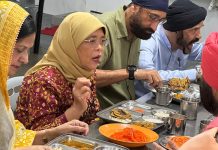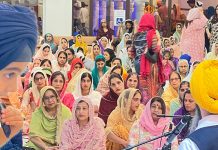 By Gurnam Singh | OPINION |
By Gurnam Singh | OPINION |
We all need some Chardhikala moment.
One of the most important ideas in Sikhi[sm] is the notion of ‘chardhikala’. In its simplest form, it can be understood as the emotional state of ‘high morale’ and ‘high spirits’. Within Sikhi, is has much deeper significance and has been instrumental in enabling Sikhs to endure centuries of oppression. In this regard, chardhikala can be defined as a form of optimism in conditions of extreme adversity combined with ‘resilience’ and a unshakable rejection of ‘defeatism’. Indeed, this state of emotional consciousness underpins the unending essence of bravery which characterises the Sikh spirit of always seeing the glass half full rather than half empty, even more when the glass is almost dry, as seems like the case today!
It is the same spirit that can be seen in abundance on the many sites across the Panjab where ordinary Panjabi farmers are literally protesting to save their livelihoods in the face of the 3 farming ordinances passed by the Government of India. These are not mere emotional outbursts against social change but, as serious academic analysis points out, a fight against the onslaught of corporate crony capitalism, which without doubt will result in the significant impoverishment of the majority of the population that is still highly dependent on farming for employment and income. In speech after speech one sees the evocation of Sikh history and the struggle that our predecessors engaged in against all odds but ultimately won.
Without the spirit of chardhikala it is difficult to see how the Panjabi farmers can maintain their struggle, but here I think, especially in the context of the general doom and gloom triggered by the COVID 19 pandemic, we all need to look towards the brighter side of life. Whilst terrible disasters, wars, famines and conflicts still constitute a great source of concern for those who are dedicated to human development and progress, we should not lose sight of the bigger historical trends, which are actually not that bad.
And in this regard, the best strategy for Panjabi farmers is not to accept the status quo, but come up with an alternative strategy that is rooted in the traditions of Panjab and inspired by the teachings and practices of the Sikh Gurus. It’s worth reminding ourselves that after his many travels Guru Nanak settled at Kartarpur where he developed a wonderful system of organic co-operative farming. We must all be weary that ideas and not violence will be the ultimate solution for Panjab. And in this regard, both the central government and the farmers must learn the lessons of the decade of violence that followed the June 1984 Indian Army assault on the Darbar Sahib.
One might ask, in a period of global conflict and COVID 19, and the havoc this is having on our lives, not to forget the real suffering caused for those contracting the virus, what is there to be happy about? However, if we take a broader historical perspective, across a range of indicators, such as education, internet access, health, life expectancy and energy supply, across the globe, all the reliable evidence suggests we have made great progress during the last 50 years. I know that it is dangerous to generalise data too much and for sure human expectations around such issues as poverty and education do change over time, but we do need to take seriously the positive trends that are highlighted if we are to maintain some positivity about the future.
As somebody who is consistently highlighting the devastating impacts of global capitalism and neoliberalism in the post-war period and the ongoing injustices in the world, I do sometimes ignore this bigger picture of progress. Perhaps, as a left intellectual, it is my role to be critical of governments, most of whom tend to be located either at the centre or increasingly on the right. In developing a more balanced view, I am not arguing for some kind of ‘third way’, but I also think rather than dismissing everything that governments and international institutions do, perhaps we need to develop a more nuanced stance that can recognise some of the positive development taking place around us.
HIGHER EDUCATION
Within my own field of Higher Education, it has become fashionable to almost ‘throw the baby out with the bathwater’. For instance, I recently came across a tweet by an well-known UK-based academic of South Asian descent who wrote that “universities serve the same social functions as prisons and mental institutions – to define, classify, control, and regulate people”. My response was, “If you believe that educational institutions are such oppressive places then perhaps you can explain your justification for working in/for these? My experience is that for sure schools and universities can be very oppressive but they can also be liberating spaces.”
It is easy to be negative about world around you, and even easier, when one speaks from a position of relative comfort, but it doesn’t help those who face oppression when we paint such a bleak picture, not least because our job as educationalists is to inspire our students to believe change and progress is possible. Yes we should be critical of what is taught and the way our universities are managed, especially in relation demands for more equity and decolonisation of the curriculum, but we cannot deny the importance and value of much wider participation in education. And for all their faults, though universities are at once repositories of colonial thought, at the same time they are incubators for decolonisation, discovery and progress.
The way I see it, the world and most institutions are like a double edged sword; there is a negative side and a positive side. Take for example, the new digital industries. For sure, whilst we can/should be critical of some of the policies and practices of the knowledge based companies, such as Google, Twitter, Facebook, who can deny the absolute value of the internet to opening up access to knowledge and global communication? Indeed, for most of us, a world without mobile phones and social media is almost unimaginable, yet, this was the case less than 30 years ago. Did you know that the first generation of smart iPhones appeared in 2003, just 13 years ago! Indeed, given that the mainstream media in India is broadly pushing a pro government line, it is social media that is a game changer in allowing an alternative voice and perspective to reach the masses.
BEING POSITIVE
So there is no crime in being positive about aspects of our lives and the world. Whilst we need to continue to fight against all kinds of evils, including racism, sexism, bigotry, poverty etc, even if we may disagree on methods of tackling these, I do believe a lot more people across the world from all political persuasions share the same concerns. Thankfully, the proportion of the population that holds overt bigoted attitudes has been diminishing and is in a minority; this wasn’t the case 40 years ago, when racism was normalised.
Ultimately, the only way humanity can/will continue to move towards a more just and equal word, where the planet and our natural resources can be protected is by pooling our collective human intelligence and working together. Therefore, despite the current COVID 19 global pandemic crisis, not to forget the many other problems facing humanity, I look forward to the future with an optimistic lens.
So let me finish with the lines form the ‘ardaas’ or daily Sikh prayer/supplication, which we read our two times per day:
 [Gurnam Singh is an academic activist dedicated to human rights, liberty, equality, social and environmental justice. He is an Associate Professor of Sociology at University of Warwick, UK. He can be contacted at Gurnam.singh.1@warwick.ac.uk]
[Gurnam Singh is an academic activist dedicated to human rights, liberty, equality, social and environmental justice. He is an Associate Professor of Sociology at University of Warwick, UK. He can be contacted at Gurnam.singh.1@warwick.ac.uk]
* This is the opinion of the writer and does not necessarily represent the views of Asia Samachar.
RELATED STORY:
Environmentalism and Racism: connecting the local to the global (Asia Samachar, 29 June 2020)
Time to flip some prevailing ideas (Asia Samachar, 24 April 2020)
ASIA SAMACHAR is an online newspaper for Sikhs / Punjabis in Southeast Asia and beyond. Facebook | WhatsApp +6017-335-1399 | Email: editor@asiasamachar.com | Twitter | Instagram | Obituary announcements, click here |































